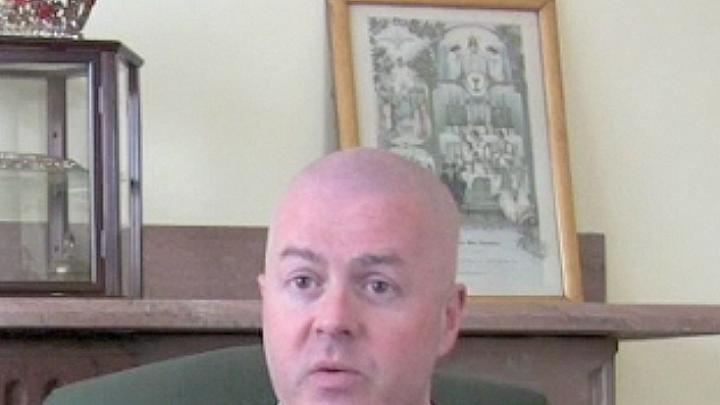When I heard that Father Paul O’Brien ’86 was coming to speak at Harvard, I knew I had to meet him. Last month, I read the story of his remarkable ministry in Lawrence, Massachusetts, and was fascinated. Since becoming pastor of St. Patrick’s parish a decade ago, he’s tackled hunger, ethnic tension, educational shortfall, and family breakdown. I saw in his work proof that the Catholic Church is still relevant—his ministry of love effects real change in his community.
Arriving in the Lowell House junior common room on Monday, I expected to learn about O’Brien’s path from Harvard to priesthood. Instead, I acquired a new world view. I was moved intellectually, emotionally, and spiritually by the tale of his journey to becoming a parish priest—and particularly by his story of an experience that changed the way he looked at the world.
Seated at the center of a ring of students, O’Brien didn’t sermonize. Instead, he transfixed his audience through storytelling.
His first story was from Harvard. How better to win college students’ trust than to admit you were once one of them? O’Brien joked that his freshman-year self was the least likely candidate for Catholic priesthood, admitting that his main pursuits that year were staying up late, drinking beer, and dating girls. But underneath, a different persona was brewing: one day, while casually attending Mass his sophomore year, O’Brien said he felt a visceral, distinct, undeniable vocation to the priesthood. He tried to suppress the experience, but it wouldn’t go away, so he sought guidance. O’Brien gave the ministry some trial runs and liked it. Thanksgiving of his senior year, he shocked his friends and family with the news, and within a year of graduation, shipped off to seminary in Rome. He has never looked back.
O’Brien then talked about his time in India. He arrived there as a young priest to work in Calcutta with Mother Teresa. In particular, one transformational experience taught him about love as he’d never understood it before, about the distinction between love in the abstract and love in action. This love, he said, still drives him. When asked what that experience was, he told us the story was brutal, but he was happy to share it. And I’m so glad he did.
His work for Mother Teresa involved searching for people dying on the streets, bringing them to the order’s home for the dying, helping care for them in their final days, and disposing of their bodies after death. One man who arrived at the home told all who would listen, “I want to die.” Through translators, O’Brien replied, “You’re here. You’re alive. We love you. We’re going to care for you.” This dialogue went on for several days in the same fashion as the man’s condition worsened. One day, a tourist visiting the hospital heard a translation of what the man was saying and jokingly said in English, “Well, then, die!” An interpreter mistook the tourist’s insensitive comment as O’Brien’s words and translated it. When the sick man heard these words, he looked at the priest and closed his eyes. He never opened them again. O’Brien realized that the man, feeling a lack of love, had succumbed to death. That interaction taught him the power of cruelty to crush the human spirit and, conversely, the power of love to nurture and sustain us beyond all other help.
The day held further lessons. The dead man had been sick with hepatitis—highly contagious, untreatable, and fatal. Determined not to let anyone catch the disease from the corpse, O’Brien carefully placed the body and all its medical accoutrements in a metal barrel to take to the dump. But in a flurry of hot, crowded confusion at the dump entrance, the barrel spilled. In an instant, O’Brien spun around and saw a little girl with “big, big dark eyes,” in “a perfectly clean blue dress,” staring up at him. As little children do, she had picked up an object off the ground and inserted it into her mouth. O’Brien stared, aghast—clamped between the girl’s teeth was the dead man’s contaminated feeding tube.
In that moment, O’Brien said, “All that mattered in the entire world was that that feeding tube not be in that little girl’s mouth.” That single-minded focus, he said, exemplified love: Love is saying that the needs of this person in front of me right now are all that matters and I’m going to help, however I can.
He yanked the feeding tube from her mouth and, after disposing of the body, he carried the little girl back to the home for the dying. The caregivers tended to her lovingly and made her as comfortable as possible, but their efforts couldn’t stop the disease. She died three days later.
The crowd in Lowell JCR was stunned, silent, still as death. It was hard to contemplate such tragedy. But in the long seconds that followed, our horror faded enough to allow O’Brien’s message seep in: What can anyone do in the face of profound ugliness but love? These experiences of pure love encapsulate the essence of O’Brien’s faith: by surrendering to love, humans can transcend philosophical questions of why people suffer and instead focus on helping those suffering around us. Choosing love is the ultimate victory over cruelty, tragedy, and evil. I won’t forget Father O’Brien’s talk, and above all this message: “Life is love.” Love is all there is.








